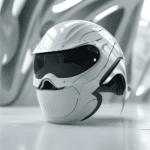Zenon’s Ultimate Guide to Restful Sleep: Unlocking Better Nights with Cutting-Edge Sleep Technology Innovations
Are You Wasting 1/3 of Your Life on Poor Sleep? Discover the Revolutionary Wellness Tech transforming restful nights forever with cutting-edge innovations in sleep technology. In this ultimate guide, we’ll delve into the world of wellness tech, exploring how it’s revolutionizing our approach to sleep and overall wellness. From AI-powered sleep trackers to smart mattresses, learn how the latest advancements in wellness tech can help you unlock better nights and a healthier tomorrow.
Understanding the Importance of Sleep Technology
Sleep is an essential aspect of our daily lives, accounting for approximately one-third of our total waking hours. However, many individuals struggle with sleep due to various factors such as stress, anxiety, or environmental conditions. This is where wellness tech comes into play – a rapidly evolving field that’s transforming the way we approach sleep and overall wellness.
The Rise of Healthtech: A New Era in Sleep Technology
Healthtech, a subset of wellness tech, has gained significant attention in recent years due to its potential in revolutionizing healthcare. By integrating cutting-edge technologies like artificial intelligence (AI), the internet of things (IoT), and mobile apps, healthtech is poised to transform the sleep industry.
Key Advancements in Sleep Technology
The following are some key advancements in sleep technology:
- AI-Powered Sleep Trackers: These devices utilize AI algorithms to monitor and analyze various factors such as sleep patterns, heart rate, and breathing rates. They provide valuable insights into sleep quality, helping individuals identify areas for improvement.
- Smart Mattresses: Equipped with sensors and advanced materials, smart mattresses can track sleep patterns, temperature, and even offer real-time feedback on sleep quality. Some models also integrate features like noise cancellation or vibration therapy to enhance the sleeping experience.
- Sleep-Enhancing Wearables: Wearable devices like fitness trackers and smartwatches often feature built-in sleep tracking capabilities. These wearables can monitor movement, heart rate, and other vital signs to provide a comprehensive understanding of sleep patterns.
- Personalized Sleep Coaching: Many wellness tech companies offer personalized coaching services, utilizing data collected from various sources (e.g., wearables, smart home devices) to create tailored sleep improvement plans. These programs often incorporate cognitive behavioral therapy for insomnia (CBT-I), mindfulness techniques, or other evidence-based methods.
- Smart Sleep Environments: Innovative solutions like smart lighting, temperature control systems, and air purification units aim to optimize the sleeping environment. By creating a sleep-conducive atmosphere, these technologies can enhance the quality of rest and overall wellness.
The Science Behind Wellness Tech: Unlocking Better Nights
Wellness tech is not just about fancy gadgets or trendy products – it’s rooted in scientific research and evidence-based practices. By understanding the underlying mechanisms, we can better appreciate how these technologies work to improve sleep quality.
The Body’s Sleep-Wake Cycle: A Complex Interplay of Systems
The human body is governed by a complex network of systems that regulate our sleep-wake cycle. The suprachiasmatic nucleus (SCN), located in the hypothalamus, acts as the primary pacemaker for circadian rhythms. Other key players include the pineal gland (responsible for melatonin production) and the sympathetic nervous system (involved in stress response). Wellness tech often targets these systems to influence sleep patterns.
Key Neurotransmitters Involved in Sleep Regulation
The following neurotransmitters play crucial roles in regulating sleep:
- Serotonin: This neurotransmitter helps regulate mood, appetite, and sleep-wake cycles. Low levels of serotonin have been linked to insomnia and other sleep disorders.
- Dopamine: Involved in motivation, pleasure, and reward processing, dopamine also influences the regulation of sleep patterns. Imbalances can lead to conditions like restless leg syndrome or periodic limb movement disorder (PLMD).
- Adrenaline: Also known as epinephrine, this neurotransmitter is released during periods of stress or anxiety. Elevated levels of adrenaline can disrupt sleep patterns and contribute to insomnia.
Table: Key Advancements in Sleep Technology
| Technologies | Description |
|---|---|
| AI-Powered Sleep Trackers | Utilizes AI algorithms to monitor and analyze sleep patterns, heart rate, breathing rates, and other vital signs. |
| Smart Mattresses | Equipped with sensors, advanced materials, and sometimes noise cancellation or vibration therapy features. |
| Sleep-Enhancing Wearables | Feature built-in sleep tracking capabilities, monitoring movement, heart rate, and other vital signs. |
| Personalized Sleep Coaching | Utilizes data collected from various sources to create tailored sleep improvement plans, often incorporating CBT-I or mindfulness techniques. |
The Benefits of Wellness Tech: Unlocking Better Nights and Overall Wellness
Wellness tech offers numerous benefits for individuals seeking improved sleep quality. By leveraging cutting-edge technologies, we can:
- Enhance Sleep Quality: Wellness tech helps identify areas for improvement, providing valuable insights into sleep patterns.
- Improve Mental Health: By addressing underlying sleep disorders or stress-related issues, wellness tech contributes to better mental health outcomes.
- Boost Productivity and Energy Levels: Well-rested individuals tend to be more productive and energetic throughout the day.
- Support Chronic Disease Management: Wellness tech can aid in monitoring and managing chronic conditions like diabetes, hypertension, or cardiovascular disease.
The Future of Sleep Technology: Emerging Trends and Innovations
The sleep technology landscape is constantly evolving. As new advancements emerge, we can expect to see:
- Increased Integration with Healthcare Systems: Wellness tech will likely become more integrated into healthcare systems, enabling seamless data sharing between providers and patients.
- Advancements in Brain-Computer Interfaces (BCIs): BCIs have the potential to revolutionize sleep research by allowing for direct neural recordings and stimulation.
- More Focus on Sleep Hygiene and Environmental Factors: Wellness tech will continue to emphasize the importance of sleep hygiene practices, such as maintaining a consistent sleep schedule, avoiding screens before bedtime, and creating a sleep-conducive environment.
Additional Sources of Information
For further reading on wellness tech and its applications in sleep technology, consider exploring the following reputable sources:
By staying informed and up-to-date on the latest advancements in wellness tech, you’ll be better equipped to unlock better nights and a healthier tomorrow.
Explore more in our category page or visit our homepage.




